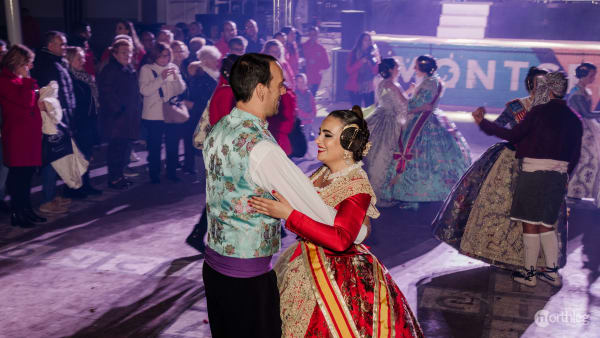Curiosities
Curiosities
In this section you can learn more about the name of the event and its common misspelling, as well as find out how the Crida changed drastically through the years, going from a donkey-riding proclamation to a ritualised ceremony.
Donkey rides, marching bands, and official ceremonies
Nowadays, the Crida follows a specific formula, defined by a few components: the time, the place, the order of the ceremony, and the language (Valencian). But none of these elements has always been set in stone.
In the beginning, the Crida was not even called that, but simply Pregón (Proclamation). During the first Pregón, in 1931, the marching bands surrounded the city and marched towards Plaza del Ayuntamiento announcing the beginning of the festivity.
After the Spanish Civil War (1939), came a period characterised by ostentatiousness and exaltation of authority. The proclamation was moved directly to Plaza del Ayuntamiento and government representatives increasingly participated in the ceremony.
A funny exception to this pomposity was the year 1944, when a bellman rode through the streets on a donkey and recited the proclamation.
In 1954, the Crida was held at the southern side of the Serranos Towers for the first time, in an attempt to attract the growing Fallas tourism and diminish the aristocratic tone the ceremony had had until then.
After much protesting, in 1969, the proclamation was spoken in Valencian for the first time, instead of Spanish. In 1990 (after a pyrotechnic accident the year before) the Crida was moved to the northern side of the Serranos Towers, which allowed for more evacuation routes and safety. In 2016, a Fallera Mayor Infantil gave her own speech at the Crida for the first time.

Cridá or Crida?
You’ll often see the word indicating the ceremony written as Cridá. However, the correct spelling in Valencian would be Crida, with no accent (meaning proclamation in English).
The mistake comes from the fact that many words, which in formal Valencian are longer (mascletada, plantada, etc…) are often shortened in their informal version (mascletà, plantà, etc..). In Spanish, they take this accented form (with the correct Spanish accent), becoming mascletá, plantá, etc…
However, the Valencian word Crida (not cridada) is already short in formal Valencian, so it needs no adaptation in either informal Valencian or Spanish.
















